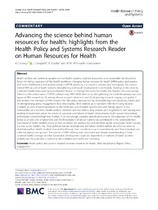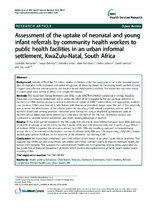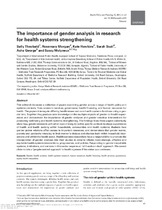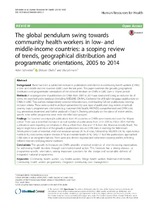| dc.contributor.author | George, Asha S. | |
| dc.contributor.author | Campbell, J. | |
| dc.contributor.author | Ghaffar, A. | |
| dc.contributor.author | HPSR HRH reader collaborators | |
| dc.date.accessioned | 2018-09-04T12:55:49Z | |
| dc.date.available | 2018-09-04T12:55:49Z | |
| dc.date.issued | 2018 | |
| dc.identifier.citation | George A.S. et al. (2018). Advancing the science behind human resources for health: highlights from the Health Policy and Systems Research Reader on Human Resources for Health. Health Research Policy and Systems, 16: 80 | en_US |
| dc.identifier.issn | 1478-4505 | |
| dc.identifier.uri | https://doi.org/10.1186/s12961-018-0346-5 | |
| dc.identifier.uri | http://hdl.handle.net/10566/4011 | |
| dc.description.abstract | Health workers are central to people-centred health systems, resilient economies and sustainable development.
Given the rising importance of the health workforce, changing human resource for health (HRH) policy and practice
and recent health policy and systems research (HPSR) advances, it is critical to reassess and reinvigorate the science
behind HRH as part of health systems strengthening and social development more broadly. Building on the recently
published Health Policy and Systems Research Reader on Human Resources for Health (the Reader), this commentary
reflects on the added value of HPSR underpinning HRH. HPSR does so by strengthening the multi-disciplinary base and
rigour of HRH research by (1) valuing diverse research inferences and (2) deepening research enquiry and quality. It
also anchors the relevance of HRH research for HRH policy and practice by (3) broadening conceptual boundaries and
(4) strengthening policy engagement. Most importantly, HPSR enables us to transform HRH from being faceless
numbers or units of health producers to the heart and soul of health systems and vital change agents in our
communities and societies. Health workers’ identities and motivation, daily routines and negotiations, and training and
working environments are at the centre of successes and failures of health interventions, health system functioning
and broader social development. Further, in an increasingly complex globalised economy, the expansion of the health
sector as an arena for employment and the liberalisation of labour markets has contributed to the unprecedented
movement of health workers, many or most of whom are women, not only between public and private health sectors,
but also across borders. Yet, these political, human development and labour market realities are often set aside or
elided altogether. Health workers’ lives and livelihoods, their contributions and commitments, and their individual and
collective agency are ignored. The science of HRH, offering new discoveries and deeper understanding of how
universal health coverage and the Sustainable Development Goals are dependent on millions of health workers
globally, has the potential to overcome this outdated and ineffective orthodoxy. | en_US |
| dc.language.iso | en | en_US |
| dc.publisher | BMC | en_US |
| dc.rights | © The Author(s). 2018 Open Access This article is distributed under the terms of the Creative Commons Attribution 4.0
International License (http://creativecommons.org/licenses/by/4.0/), which permits unrestricted use, distribution, and
reproduction in any medium, provided you give appropriate credit to the original author(s) and the source, provide a link to
the Creative Commons license, and indicate if changes were made. The Creative Commons Public Domain Dedication waiver
(http://creativecommons.org/publicdomain/zero/1.0/) applies to the data made available in this article, unless otherwise stated. | |
| dc.subject | Health policy and systems research | en_US |
| dc.subject | Human resources for health | en_US |
| dc.subject | Multi-disciplinarity | en_US |
| dc.subject | Rigour | en_US |
| dc.subject | Policy engagement | en_US |
| dc.title | Advancing the science behind human resources for health: highlights from the Health Policy and Systems Research Reader on Human Resources for Health | en_US |
| dc.type | Article | en_US |
| dc.privacy.showsubmitter | FALSE | |
| dc.status.ispeerreviewed | TRUE | |




